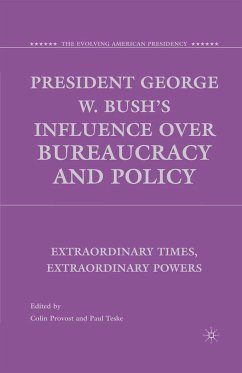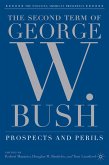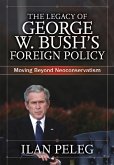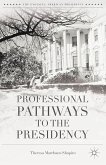Dieser Download kann aus rechtlichen Gründen nur mit Rechnungsadresse in A, B, BG, CY, CZ, D, DK, EW, E, FIN, F, GR, HR, H, IRL, I, LT, L, LR, M, NL, PL, P, R, S, SLO, SK ausgeliefert werden.
"Focusing upon aspects of President Bush's domestic policy that have received less attention than his foreign, security, and judicial policy, Colin Provost and Paul Teske ask what effects the President's expansive view of executive power has had on policy making and policy outcomes. They and their able contributors find complex patterns of agency resistance, inertia, congressional politics, and implementation failures of a kind that make Mr. Bush's presidency often less radical in its policy effectiveness than in its policy initiatives, and less completely disruptive adeparture from its predecessors than either its proponents or critics have sometimes claimed. This is a fine and welcome book on a fundamental problem in and with American politics and public policy which deservesto be widely read." - Nigel Bowles, University Lecturer and Balfour Fellow in Politics, St. Anne's College, Oxford University
"This volume, based on a conference held at the University of Oxford, brings together papers that focus on the George W. Bush administration's efforts to gain control over the American federal bureaucracy. The authors demonstrate the effectiveness of the administration's drive to appoint officials in sync with the administration's policy objectives. They also examine the impact of these personnel on policy administration, and find that changes in top personnel do not always ensure the expected outcomes. Students of administrative politics and readers interested in the sorry history of the Bush years will find this book a source of useful information and provocative interpretations of the results of the administration's efforts." - Joel Aberbach, Distinguished Professor of Political Science and Public Policy, UCLA









